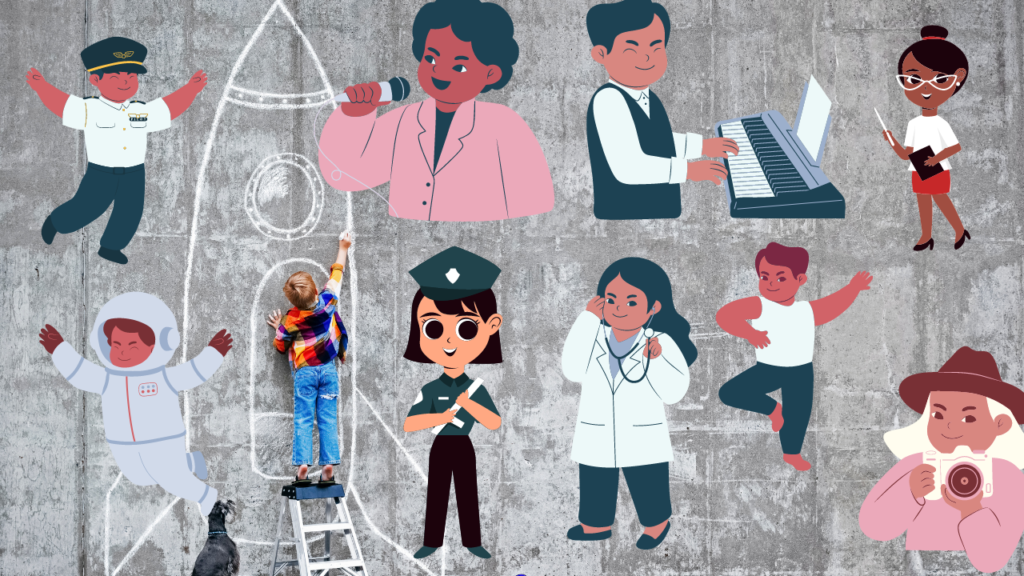In today’s fast-changing world, my kids need more than just what they learn in school. This piece will look at important skills and chances that can help make your child ready for whatever the future brings. By making sure they grow in all areas, we help them face tomorrow’s challenges with confidence. read it carefully Future-Proof Your Child Skills Beyond School
Key Takeaways
- Develop well-rounded skills to adapt to the evolving job market
- Foster creativity and problem-solving abilities for future success
- Nurture critical thinking and analytical skills for schooling students
- Encourage entrepreneurial mindsets and effective communication skills
- Explore extracurricular activities and embrace technology for digital literacy
The Importance of Developing Well-Rounded Skills: Future-Proof Your Child: Skills Beyond School
I think today job market keeps changing, so it’s crucial to give our children various skills. They need more than good grades to succeed. Being able to adapt, solve problems, and understand emotions will be key.
Teaching them to be strong and sure of themselves will help them face any challenge. This is how they can do well in a world full of surprises.
Adapting to the Evolving Job Market
The jobs of the future will not be like today’s. Things like robots, AI, and tough competition are changing what employers want. Having many skills will keep children ready for these shifts.
- Cultivate adaptability and problem-solving skills to handle novel situations
- Develop emotional intelligence and interpersonal abilities to collaborate effectively
- Embrace lifelong learning and stay agile in the face of technological advancements
Building Resilience and Confidence
Life can be unpredictable, so making our children resilient and confident is important. These skills help them bounce back from failures and stay on the path to their dreams.
- Encourage a growth mindset that views obstacles as opportunities for growth
- Help them develop coping mechanisms to manage stress and anxiety
- Instill a sense of self-belief and the courage to take calculated risks
By focusing on adaptability, resilience, and a broad skill set, we prepare our kids for success. They’ll be ready for whatever the job market throws at them. This way, they become strong, skilled leaders of tomorrow.
“The future belongs to the adaptable. By cultivating a diverse skill set and the ability to bounce back from challenges, our children can unlock a world of opportunities.”

Fostering Creativity and Problem-Solving Abilities
In a fast-changing, tech-heavy world, creative thinking and problem-solving are key. We need to encourage our kids to dream big, try out new ideas, and face problems head-on. This prepares them for a tomorrow full of new challenges and chances.
Building creativity is vital for the jobs our children will face. By doing things like open-ended tasks, hands-on work, and using their imagination in play, they learn to see beyond what’s usual. They become better at solving problem-solving skills and using critical thinking, ready to handle tricky problems with confidence.
Encouraging kids to follow their passions helps unleash their creativity. It could be coding, painting, making music, or starting a business. Giving them tools and cheering them on helps spark their creative minds. They learn to look at problems in fresh, clever ways.
| Skill | Benefit |
|---|---|
| Creativity | Generates innovative solutions and adaptability |
| Problem-solving skills | Develops the ability to tackle complex issues effectively |
| Critical thinking | Enhances analytical and decision-making capabilities |
Teaching kids these skills makes them ready for whatever the future holds. As parents and teachers, it’s up to us to help them grow their creativity, problem-solving skills, and critical thinking. This way, we set them up to do well in their lives and careers.
Skill for schooling students Future-Proof Your Child: Skills Beyond School
Preparing kids for the future means more than just books. We must teach them to think and solve problems. This way, they will do well in school and also in life.
By encouraging them to question, look at facts, and decide, we help build their critical thinking. This skill is key for handling diverse points of view and facing new challenges. Analytical skills allow them to understand complex issues by breaking them down.
Fostering a Questioning Mindset
Getting kids to ask why and how is important for their growth. We should encourage them to wonder about things, challenge common ideas, and look for real solutions. This fosters their ability to think on their feet and handle tough situations later.
Developing Analytical Reasoning
Teaching kids to be good at analytical skills is also vital. This involves showing them how to find and make sense of information. They learn to spot trends and draw smart conclusions. These skills help them make good choices and deal with changes.
Let’s focus on teaching our kids critical thinking and analytical skills. These are powerful tools for success, both in school and out. They help our children question, think, and solve, readying them for a shifting world.

Encouraging Entrepreneurial Mindsets
Teaching kids to think like entrepreneurs gives them the tools to spot chances, take smart risks, and make their ideas real. It’s all about boosting their creativity, problem-solving, and acceptance of tough challenges. This prepares them to lead with innovation in a world that’s always evolving.
A big part of this is showing them the power of a growth mindset. Here, they learn that with effort and hard work, they can improve. This helps children see challenges as ways to grow. It builds their toughness and adaptability for a future that’s always changing.
Entrepreneurial thinking also means they need to be good at problem-solving, thinking critically, and taking smart risks. Giving them chances to learn hands-on, through projects, is key. It helps them build these skills and the courage to face big problems.
Encouraging innovation and creative thinking is another vital piece. It’s about showing kids different viewpoints, urging them to ask why, and supporting their ideas with what they need. This way, kids can grow up to be the ones who come up with answers to our world’s challenges.
But it’s more than getting ready for jobs of the future. It’s about giving them the creativity, problem-solving, and courage they need to do well in a world that’s always changing. By doing this, we help our children lead and innovate in the years to come.
Developing Effective Communication Skills
In today’s fast-paced, global world, good communication is key. It’s important for success. By developing strong speaking abilities, we can help our children share their thoughts. They learn how to work with others and make connections that last.
Mastering Public Speaking
Public speaking can make our child more confident. It improves thinking skills and makes sharing complex ideas easier. Encourage your child to join debates, speaking contests, or present at home. This helps them get over stage fright, arrange their ideas, and talk clearly and with confidence.
Honing Interpersonal and Networking Abilities
Building interpersonal skills and networking well is just as important. You can help by getting your child into group activities, sports, or volunteering. Here, they can learn the value of active listening and building real connections. This shapes how they work with people from different backgrounds, offering them new opportunities.
“The ability to communicate effectively is not just a skill, but a superpower that can open doors and unlock opportunities.”
Improving how a child talks and listens is truly investing in their future. No matter their career dreams, sharp communication skills are vital. They help in leadership, entrepreneurship, and any other path they might take.
Exploring Extracurricular Activities
Extracurricular activities are key for building well-rounded kids. They include sports, arts, and more. These activities offer a lot for our children’s growth.
Sports and Physical Activities
Taking part in sports teaches important life lessons. Kids learn teamwork, discipline, and how to lead a healthy life. Team sports show the value of working together and solving problems.
For solo sports, kids learn self-control, how to keep trying, and to work hard. Not only does physical activity keep kids healthy, but it also keeps their minds sharp. It can lower stress, help them focus, and make them more confident.
Arts and Culture
Exploring arts and culture sparks kids’ creativity. Music, dance, art, and theater help them express themselves and think deeply. They also learn to appreciate different kinds of art.
These activities take kids out of their comfort zones. They see and understand new cultures, which makes them more caring, respectful, and open-minded. These are important tools for the future in our connected world.
| Extracurricular Activity | Benefits |
|---|---|
| Sports and Physical Activities | Teamwork and collaboration Discipline and self-control Healthy lifestyle |
| Arts and Culture | Creative expression Critical thinking Cultural awareness |
Encouraging kids to try a variety of activities sets them up for success. It helps in finding good jobs and dealing with the world’s challenges.

Embracing Technology and Digital Literacy
In today’s world, being good with technology is key. It helps our kids not just survive, but thrive. So, getting them familiar with the digital world is a smart move for their future jobs. They will need these future-proof skills everywhere.
Learning about different tech tools is important too. Whether it’s using office programs or knowing how to code, these are skills for the jobs of tomorrow. They also need to be comfortable with social media and online chats.
But just knowing tech isn’t enough. Kids also need to learn to be good digital citizens. This means they use tech responsibly and think carefully about what they see online. Teaching them to do the right thing online is crucial.
- Develop proficiency in a wide range of technology tools and software
- Foster critical thinking and responsible use of digital platforms
- Embrace coding and programming as essential future-proof skills
- Encourage exploration of emerging technology trends and innovations
- Cultivate a deep understanding of digital ethics and citizenship
Helping our kids with digital literacy means they are ready for the tech future. This way, they’ll have the confidence and skills to lead in a digital world.
“The technology you use impresses no one. The experience you create with it is everything.” – Sean Gerety
Building Global Perspectives and Cultural Awareness
Today, it’s key that our kids understand the world at large. They need to know different cultures and viewpoints. This helps them learn about others and see the world’s full picture.
Exploring New Cultures and Traditions
To gain a global outlook, kids should be open to new cultures and traditions. This could mean:
- Going to community cultural events and festivals
- Tasting different foods and learning their history
- Watching shows or reading books about various cultures
- Having pen pals or meeting people online from other countries
- Visiting new places and learning how they live
By taking part in these activities, children appreciate the global and cultural sides of life more. This prepares them for a world where cultural diversity and connection are vital.
“The more you understand different cultures, the more you understand the universal nature of people.” – Jet Li
Encouraging a global mindset and cultural awareness in the young helps them prosper. They will be ready to face our diverse, connected world. This is beneficial both for their own growth and their future in a worldwide community.

Fostering Emotional Intelligence and Empathy
It’s important to prepare our kids for future jobs. But we must remember something just as vital: teaching them about emotions and how to understand others. These skills don’t just help make life fulfilling. They’re also super useful at work.
Being emotionally smart means knowing and handling feelings, both ours and others’. It’s a big part of knowing who you are. That’s what helps kids work well with others. They can handle hard times without losing their cool.
Letting kids recognize and feel for others’ emotions is crucial. It helps them see things from others’ points of view. This skill helps with making real friends and fixing problems.
- Cultivate self-awareness: Encourage children to identify and express their emotions, fostering a deeper understanding of their inner world.
- Teach emotion regulation: Provide strategies for managing strong feelings, such as taking deep breaths or engaging in mindful activities.
- Model empathetic behavior: Demonstrate active listening, compassion, and the ability to consider different perspectives.
- Facilitate interpersonal interactions: Create opportunities for children to practice collaboration, conflict resolution, and effective communication.
We’re not just teaching academic stuff. We’re making sure our children are skilled all-around. These people skills they learn will help them in life and at work.
| Skill | Importance | Strategies for Development |
|---|---|---|
| Emotional Intelligence | Enables self-awareness, emotional regulation, and effective communication. | Encourage emotion identification and expression Teach stress management techniques Model emotionally intelligent behavior |
| Empathy | Fosters compassion, strengthens relationships, and enhances social problem-solving. | Promote active listening and perspective-taking Organize group activities that encourage cooperation Discuss the importance of considering others’ feelings |
Boosting these skills is key to making sure our children do well now and in the future. These abilities are critical, both in their personal lives and at work.
“Empathy is about finding echoes of another person in yourself.” – Mohsin Hamid
Encouraging Lifelong Learning and Curiosity
In today’s fast-changing world, knowing how to learn and adapt is key to lasting success. It’s vital that we inspire our kids to have a growth mindset. They should learn to be always curious and love lifelong learning. Doing so will help them face anything that comes their way with more confidence and strength.
Starting to love learning begins by making an environment that values exploring ideas and finding out new things. Parents and teachers can encourage kids to wonder, try things, and look for new adventures. By living a life full of lifelong learning ourselves, we show that learning isn’t just for school. It’s something you do all your life to grow and get better.
Having a growth mindset is very important. We need to teach kids to see challenges as chances to learn, not as roadblocks. This helps them become strong and flexible, ready for our fast-changing world. We should cheer them when they put in effort, keep trying, and dare to take chances. This way, they will always be eager to learn.
Also, getting kids involved in extracurricular activities broadens their skills and understanding of the world. Whether it’s through art, culture, sports, or any other activity, kids can learn to solve problems and adapt. These activities are not just fun but they make kids more interested, creative, and flexible.
| Skill | Benefit |
|---|---|
| Lifelong learning | Enables continuous personal and professional growth |
| Curiosity | Drives exploration, discovery, and a thirst for knowledge |
| Growth mindset | Fosters resilience, adaptability, and a willingness to embrace challenges |
| Adaptability | Helps navigate an ever-changing job market and societal landscape |
By helping children develop these skills and ways of thinking, we prepare them to be lifelong learners. They will be able to solve problems and be confident individuals ready for the future’s challenges.
“The beautiful thing about learning is that no one can take it away from you.” – B.B. King
Conclusion
Focusing on future-proof skills helps kids succeed in a changing world. They need more than just what school teaches to do well. Learning to think creatively, understand the world, and handle emotions is key. These skills prepare them for the future’s ups and downs.
Teaching kids to grow in all areas makes them ready for the future job scene. This way, they adapt to the constantly changing world. Learning this broad way helps our kids and also the future itself. It shows our goal is to foster a generation that thinks differently and with care.
Education is changing fast, but we can help our kids succeed by giving them the right skills. Together, we can make sure they learn to be flexible, solve problems, and care about others. This way, they are ready to lead in a world that’s always getting more complicated.
FAQ
What are the key skills and experiences that can help future-proof my child’s success?
It’s key to develop more than just what school teaches us. Your child should have skills for the changing job market. They should learn to be confident, creative, and good at problem-solving. Critical and analytical thinking are also important. And it’s good to teach them to think like entrepreneurs.
Why is it important to cultivate effective communication skills in children?
Being a good communicator is vital in any career. This includes being good at talking in front of others and connecting with people. These skills help children share their thoughts, work well with others, and make friends.
How can extracurricular activities benefit my child’s development?
Getting involved in different activities outside of school offers a lot. It can be sports, arts, or learning about other cultures. This helps with teamwork, staying focused, being creative, and expressing yourself. It also makes your child feel good and grow.
Why is it crucial to embrace technology and digital literacy?
Today, knowing about technology is very important. It’s how we live and work. Teaching your child to be tech-savvy helps them feel at ease with new tools. This way, they’re ready for a future that’s all about tech.
How can cultivating global perspectives and cultural awareness benefit my child?
Learning about different parts of the world can really open doors for your child. It teaches them to understand and connect with people from everywhere. This makes them kinder, more flexible, and better at seeing the big picture.
Why is it important to nurture emotional intelligence and empathy in children?
It’s not just about what you know, but how you get along with others. Teaching kids to be aware of their feelings and consider how others feel is really important. It makes them good at making friends, working in teams, and being happy in their own life later on.
How can we encourage lifelong learning and curiosity in our children?
In a world that’s always changing, learning all the time is a must. Fostering a love for learning and a mindset that’s open to new things is key. This helps kids face challenges and grab new chances with confidence.







